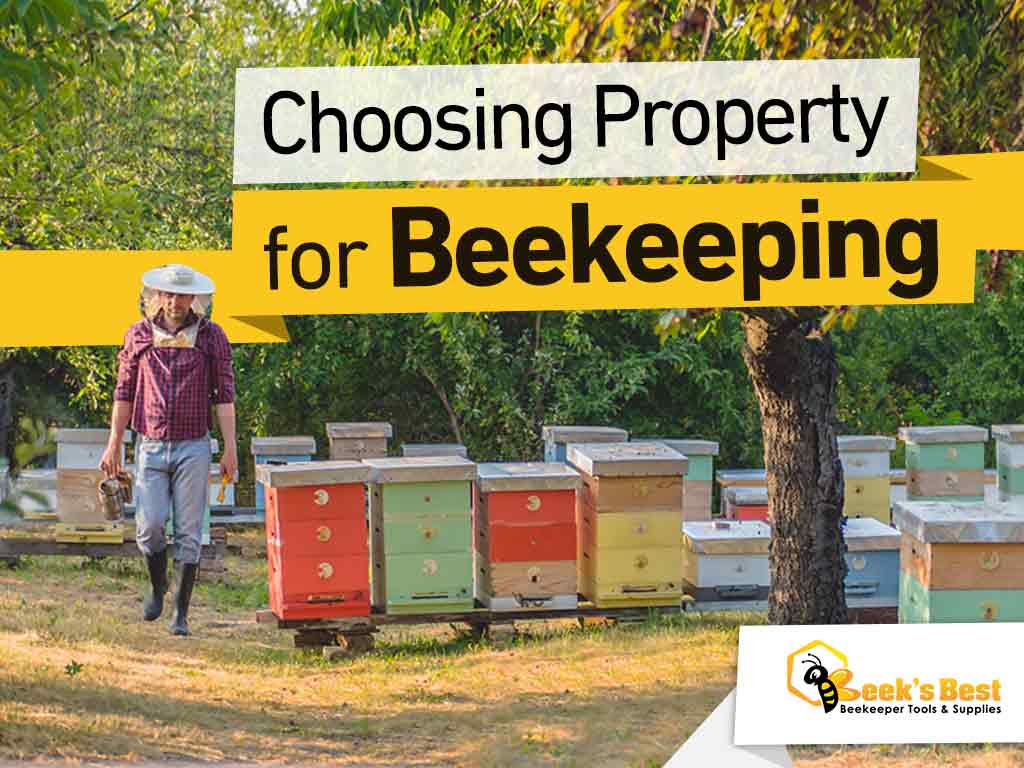As a new beekeeper, or even a potential beekeeper, one of the first undertakings you will have is choosing a location for your hives. While it is true that bees can live almost anywhere, as their caretaker it is up to you to find the best place to raise a healthy colony.
So, what should you be looking for in a location to keep bees? Some of the factors you will need to consider include human activity, flight path for your bees, and nearby plant and water sources.
How many acres of land do I need for beekeeping?
As a rule, bees need at least one acre of land that includes blossoming trees, shrubs, or flowers to survive. They will travel several miles to find nector and pollen. However, there are many factors that play a part in the survival of bees that no one can really say for sure. It may also vary based on the region of the world where you hope to set up your apiary.
- Human Activity – As you think about places to put your bees, make sure it is one that is away from every day human activity. Even peaceful, gentle bees may become defensive if humans are interfering with their daily lives.
- Flight Path – Hundreds, if not thousands, of bees can live in a colony at one time. During the day they are constantly working, which means a lot of activity surrounding the hive, particularly around the front entrance. For this reason, you should have plenty of space, at least 5 feet, cleared for your bees to come and go.
- Nearby Plants & Water Sources – Surrounding your bees by a forest may sound like a good idea, but it may not yield the best results. Dense forest areas block the sunlight needed for plants to grow and prevent them from producing the pollen and nectar that bees need to live. An open field, with some wetland nearby, is an ideal location for keeping your bees.
Can I only grow bees in a rural setting?
Whether you live in the city, the suburbs, or a more rural location, as long as the laws permit, you can set a beekeeping operation. While the ideal location includes easy access, drainage, nearby water, some sunlight, and little wind, you may not always be able to find this in every setting.
Urban Beehives
When you think about beekeeping, a big city is probably not the first place that you would think of finding hives. However, many urban beekeepers have found success placing hives on rooftops or balconies. Keeping the bees in a higher location decreases the chance of human interaction on a regular basis. Urban beekeepers may also be part of a local beekeeping associations that allow members to keep a few hives.
Suburban Beehives
As with urban beekeeping, beekeepers living in more suburban areas face the similar challenge of keeping bees away from the daily activities of humans. Some things to think about in this suburban scenario include nearby foot traffic, property lines, barriers to prevent neighbors or passersby from getting to closet to the hives, and nearby water sources.
Country Beehives
With more open space, beekeepers looking to set up hives in a rural setting have a lot of options when it comes to picking a spot for beehives. There should be plenty of space to spread out the hives if you have multiple structures, and room to give your bees a flight path in and out of the hives. In this case, speaking with other local beekeepers about their locations may be a good way to find an option that will work best for you.
Local Bee Laws
Despite having lived with humans for thousands of years, bees are still unwelcomed in many areas due to fear. As a beekeeper, it is crucial that you understand the responsibilities and liabilities you are taking on. The best place to start researching and learning is with your state and local government.
State codes regarding beekeeping should be easily accessible. Resources can usually be found at your library, and now online. The state codes should tell you how beekeeping is regulated in the state, and which department oversees the agriculture associated with beekeeping. These groups will oversee the types of bees and beekeeping paraphernalia that can be used, as well as educated beekeepers across your state.
Local laws may also have an impact on where you can build your hives. Not all communities have laws regarding beekeeping, but if you live in a more densely populated area you are more likely to have some regulations, since bees can sting and swarm, and could pose a threat to people off your property. If the laws in your community are unclear, be sure to ask advice from local leaders in your city or county.
Is beekeeping classed as agricultural?
Beekeepers enter the field because of the many agricultural products produced by bees. In addition to the honey they produce, bees give us beeswax, and royal jelly. Beyond these commonly though-of products, bees are also providers of another service to farmers – the pollination of food crops. For this reason, beekeeping is treated as agriculture. It may also be regulated as a way of qualifying farmland for real estate tax purposes. To learn the specifics of this agricultural classification, you can contact your state’s agriculture or tax department.
Making the right decision
Choosing where to locate your bees is not a decision that you should make quickly. Be sure to do your research, check local laws, and be courteous of any neighbors you may have.


Recent Comments